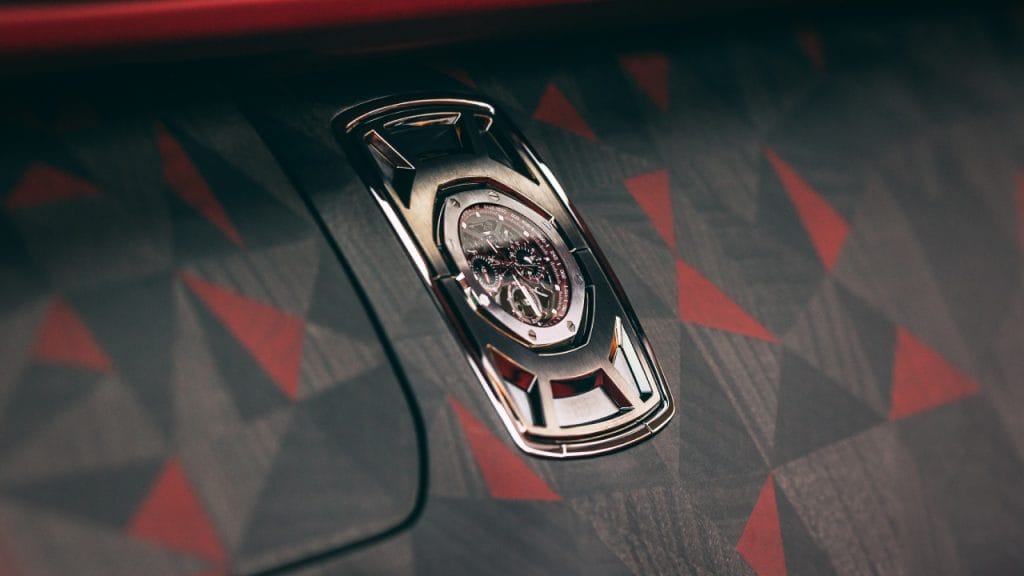When we look back at the Renaissance Masters, often overlooked are the patrons who financed the creativity that continues to inspire us today. On 19 August, it was if the Medici had come to Monterey Car Week, as Rolls-Royce presented its latest masterwork to an undisclosed family extremely supportive and beloved by the brand. After six years, twice as long as it took Michelangelo to sculpt the statue of David, the 119-year-old marque has unveiled its latest one-off commission, La Rose Noire Droptail.

The third such coachbuild, following the 2017 Sweptail and the 2021 Boat Tail, the Droptail is a two-seat roadster. This departure from the four-seat configuration—de rigueur in the British automaker’s contemporary model line—is evocative of the 1912 Silver Ghost “Sluggard”, the 1925 Silver Ghost Piccadilly, and the 1930 Rolls-Royce Phantom Brewster New York Roadster.
“It is a very different time from how it used to be in the 1920s to how it is today; it is technically far, far, far more complex than it was over 100 years ago,” says Torsten Müller-Ötvös, CEO of Rolls-Royce Motor Cars, in regards to the challenges presented in creating a truly custom car. And by “custom”, we’re talking about tailoring that goes exponentially beyond embossing the Champagne chiller and headrests with your initials, but actually shaping your own vehicle.

“We will be doing four of these Droptails, very different Droptails, and they are all around a love story,” says Müller-Ötvös during an invite-only preview of the car just hours prior to its customer delivery at Rolls-Royce’s private residence in Pebble Beach. For this first example, Müller-Ötvös describes the theme around it as taking a “honeymoon cruise . . . in this case, it’s a love story they [the clients] are celebrating this weekend—their 30th wedding anniversary.”
Integral to the theme is the Black Baccara rose, which is an element ubiquitous to the 17.3-foot-long roadster measuring just over 6.5 feet in width. It’s most evident in the two-tone colour scheme that, like the rose itself, varies from pomegranate to black, and morphs in between depending on how it dances with the light. It was a look that took 150 versions to get right. Equally eye-catching is what is claimed to be “the single most complex wood project ever undertaken by Rolls-Royce.” The parquetry presentation spans the entire sweep of paneling behind the seats and extends onto the doors.

“Here the client was quite specific in their request to create the impression of rose petals flowing through the interior, but to do so in an abstract way,” says Alex Innes, head of Coachbuild Design at Rolls-Royce Motor Cars, adding that it comprises “1,603 individually cut and stenciled pieces of black sycamore, sourced in France at the client’s request.” That entire process alone took three years.
Another distinct visual accent is the custom Audemars Piguet 43 mm Royal Oak Concept Split-Seconds Chronograph GMT Large Date that Innes describes as a commission that involved “not just a unique timepiece, but a mechanism that allows the timepiece to be removed from the wrist and then retreat deep down into the fascia of the car itself.”

The Rolls-Royce’s exterior design also features a few firsts, most noticeable being a new take on the Pantheon Grille, which eschews the normally straight vanes for ones that bend slightly near the top—something the marque has never done before. And all the metal has received a new treatment as well. “We developed a completely unique, technological finish that brings not only this darker hue to all of the metalwork, but is highly reflective,” says Innes, “ensuring that La Rose Noire wears the personality of the environment, wherever it finds itself in the world.”
As for the shape of the body, Innes points out the “very short front overhang and also a strong inclination rearwards. But more unusual for Rolls-Royce is that you have a very compact and agile rear overhang and, more profoundly, a very, very generous body-side section to an incredibly shallow windscreen proportion.” The result of these aesthetic measures is that it gives the sensation of, as Innes describes it, “pushing the owners deep down inside the cabin space and cosseting and protecting them as you would expect from a roadster body style.”

La Rose Noire, while shown as a roadster, does have a separate roof component that, when installed, “transforms it into a formidable looking coupé,” according to Innes, who mentioned that, in order to get the desired styling, his team “studied West Coast custom hot rods from the 1930s.”

Although this Droptail and Rolls-Royce’s coachbuilds in general are highly personalised and could easily be imagined to stay within multiple generations of a family, there’s an obviously strong collectable component to the car. After all, it’s art like the pieces personally commissioned by the Medici that are why we build museums today.
Previously published on Robb Report.




